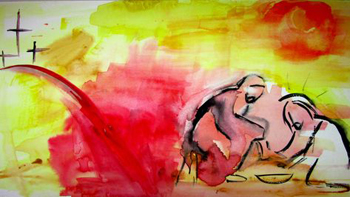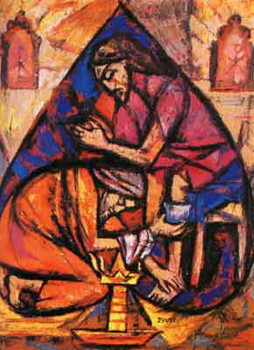For Sunday October 21, 2018
Lectionary Readings (Revised Common Lectionary, Year B)
Isaiah 53:4-12
Psalm 91:9-16
Hebrews 5:1-10
Mark 10:35-45
This week’s Gospel reading begins with a demand-cloaked-as-a-request. Arguably the boldest and most entitled request recorded in the New Testament. The request is made by James and John, two brothers who leave their father’s lucrative fishing business to become Jesus's disciples. Jesus calls them “Sons of Thunder,” an apt name for two young men so zealous and hotheaded, they ask their Teacher elsewhere in the Gospels to rain down heavenly fire on a Samaritan village that refuses Jesus its hospitality.
As the story opens, Jesus is making his way to Jerusalem, all the while telling his disciples that torment and death await him there. Cue the Sons of Thunder: “Teacher, we want you to do for us whatever we ask of you.” Astonishingly, Jesus responds to this presumption with patience and curiosity: “What is it you want me to do?” “Grant us to sit,” they respond without hesitation, “one at your right hand and one at your left, in your glory.”
“Glory” isn’t a word we use much nowadays. It’s a churchy word we hear in sermons or hymns. But let’s face it: we have our cherished 21st century synonyms. Though our vocabulary differs, we recognize too well what James and John are asking for. Prestige, fame, kudos, praise, distinction, success, honor, renown. Pride of place. Claps on the shoulder. Applause. In short, the Sons of Thunder want to finish first, win big, and retire as privileged favorites with unique, intimate access to Jesus’s power and glory. In fact, they don’t simply want these things; they’re convinced that they deserve them. That they’re entitled to them.
It’s easy to gasp. Or to laugh. Or to dismiss the two boys as arrogant fools. But Jesus does none of these things. He takes their request seriously, and engages in a conversation that is compassionate rather than condemning. So I want to pause for a moment and consider what James and John get right in this passage. I want to be fair, and give credit where credit is due.
 |
First, the two brothers place their full faith in the right person. Undaunted by Jesus’s gloomy predictions of suffering and death, they cling to the belief that Jesus will prevail in the end. Though they have no concrete idea what Jesus means by “resurrection,” they trust him — his word, his love, his power, his leadership, his mission. Given what they’ve seen, heard, and experienced, they can’t conceive of a meaningful future apart from their Teacher. Their personal hopes and dreams —imperfect though they might be — are rooted in Jesus. Are ours?
Second, they are ambitious for the reign of God. They expect and want Jesus to be glorified; they expect and want the world’s wrongs to be righted. They’re not complacent about injustice, oppression, hatred, and violence; they actively long for Jesus’s kingdom to arrive in all its glory and remake the world. Interestingly, Jesus does not criticize James and John for these ambitions. He doesn’t say, “It’s wrong of you to want greatness. It’s sinful of you to strive.” Instead, he redirects their striving. He offers them a radically different definition of greatness. This suggests to me that God can and will work with our desires and ambitions. God wants us to want more, seek more, hope more, and need more. What’s lethal to the spiritual life is not our striving; it’s our apathy, our cynicism, our carelessness, and our complacency. Desires can be redirected. Ambitions can be purified. But my unwillingness to care? My numbness of soul? My reluctance to hope because I fear disappointment? These are the dead ends. These are the roadblocks to abundant grace and transformation.
Thirdly, James and John ask. They approach Jesus boldly, and make their request with hearts full of confidence. Is the request tacky? Yes. Is it borne of ignorance and immaturity? Yes. Are some of the motives behind the request selfish? Yes. And yet. They ask. They engage in real relationship with Jesus, and express an authentic desire to remain close to him. As I reflect on this, I am reminded of how often I don’t ask, don’t engage, and don’t lean. How often I go through my days as if God doesn’t really exist, even as I profess to be God’s child, God’s follower, God’s friend. Real relationships require honest engagement. They require love, affection, and an ongoing desire for proximity and intimacy. James and John exemplify all of these traits in their friendship with Jesus, and I would do well to follow in their footsteps. After all, the Sons of Thunder aren't simply disciples; they’re members of Jesus’s beloved inner circle. Jesus allows them — along with Peter — to witness many things the other disciples don't. There’s something about their unguarded approach and demeanor that Jesus cherishes.
 |
So, okay. The Sons of Thunder get some things right. But they also get a key thing wrong, and that’s where the heart of this week’s Gospel lies. The easiest way to describe their error is to contrast the demand they make of Jesus with the question Jesus asks them in return. “Teacher,” they say, “We want you to do for us whatever we ask of you.” In other words: “We’re entitled to something here, Lord. We’re willing to wait patiently, but you’ll need to give us our due in the end. After all, we’ve sacrificed a lot to be your disciples. What’s in it for us?”
In return, Jesus asks the question he always asks: “What is it you want me to do for you?” Not, “Here’s what I want,” or “Here’s what I’m entitled to,” but rather, “I am here to serve. How can I serve you?”
What James and John fail to understand is that service in the kingdom of God is not a second-class means to a first-class end. Service is the end. Service is abundance. Service is power. Service is glory. “Whoever wishes to be great among you must be your servant, and whoever wishes to be first must be slave of all.” The only path to success in Jesus’s kingdom economy is through the surrendering of our most cherished forms of entitlement. By all means aspire to glory! But recognize that glory by Jesus’s definition is not an accretion of privilege. It’s not upward mobility. It’s not permission to guard, hoard, and multiply your own. Glory in God’s kingdom is an exercise in subtraction. It’s a movement downwards. It’s the generous and perpetual expending of one’s self in love.
In a few short weeks, we will leave “Ordinary Time” behind, and enter into the sacred season of Advent. As the Church, we will contemplate a God who enters humanity red-faced and crying, a God whose greatest displays of power include riding on a donkey, washing dirty feet, hanging on a cross, and frying fish on a beach for his agnostic friends. How exactly have we gone from this God of kenosis — the God who empties himself of all privilege, the God who perpetually pours himself out and surrenders his own life for his loved ones — to God as Iron Man?
 |
I wonder if the fantasties of earth-shattering power and glory we impose on God are just that — our own lustful fantasies. Maybe such a God is easier — more familiar, more palatable, more impressive. He might, after all, keep us passive and confortable. Why bother getting involved in the world’s sorrows ourselves when God can wave his magic wand and fix everything while we wine and dine at his heavenly banquet? Why lean into our own creativity, why respond to our own deep longings for justice, why call each other out to engage in the slow, risky work of renewing creation, when “glory” is really about grabbing the fanciest seats in Jesus’s throne room? Why contemplate a Jesus who glories in serving his guests — refilling their water glasses, warming up their leftovers, preparing their rooms, washing their feet — when we can contemplate a cozy combination of Superman and Santa Claus instead?
Our Gospel lectionary this week leaves us with two questions. Two options. James and John seek glory by privileging themselves: “Do for us. Grant us.” Jesus epitomizes glory by privileging others: What can I do for you?” Dare we trade one question for the other? Dare we surrender privilege for glory? The invitation is to mature in a downward direction — to serve, serve, and serve some more. Dare we find the courage to make Jesus’s question our own?
Image credits: (1) Pinterest.com; (2) Words of Life; and (3) Pinterest.com.





